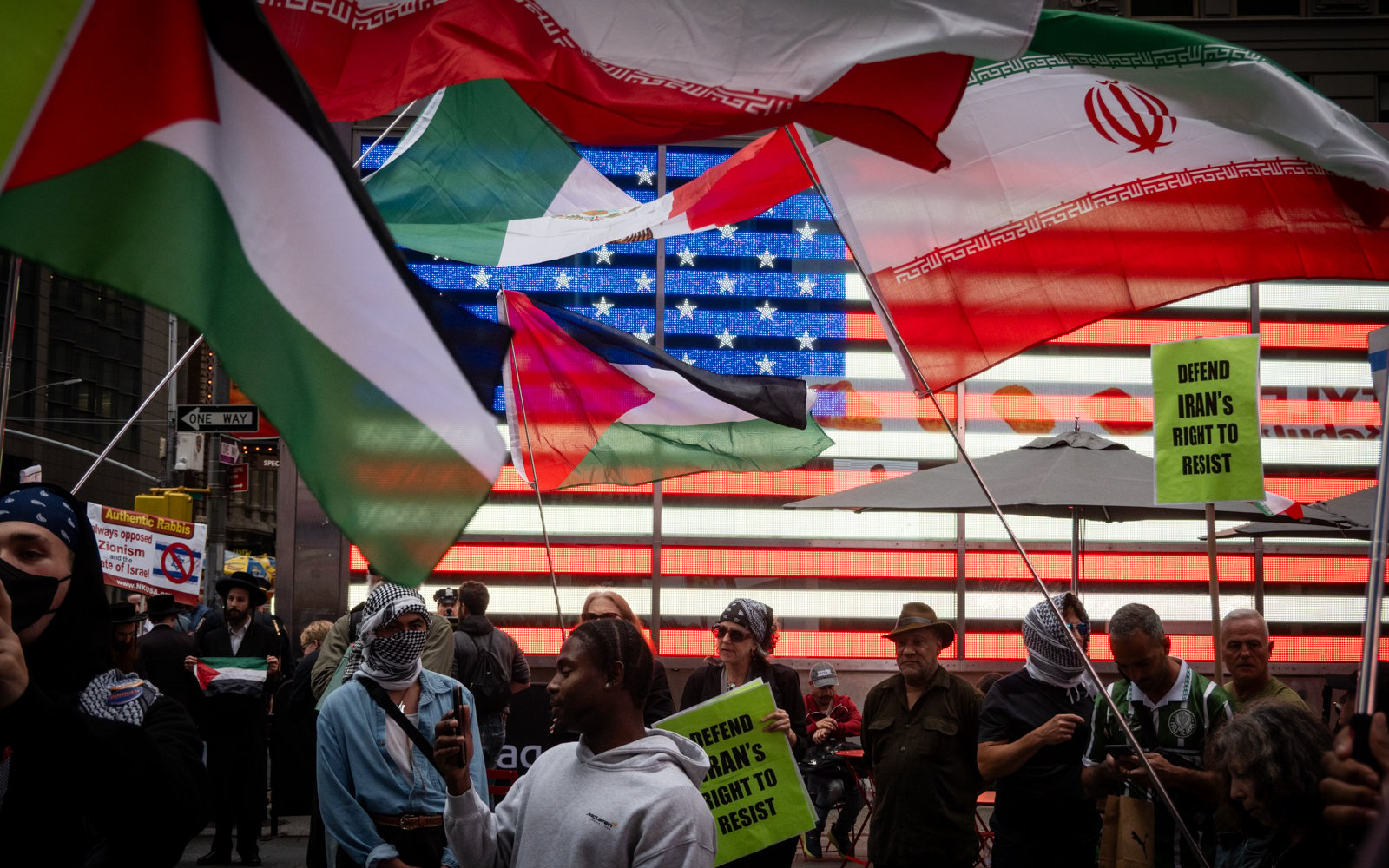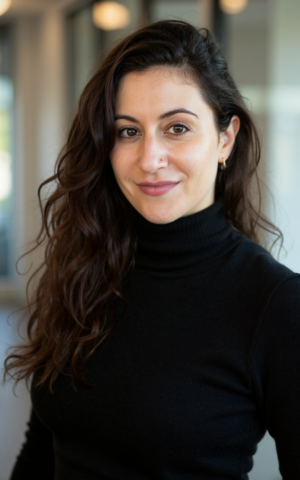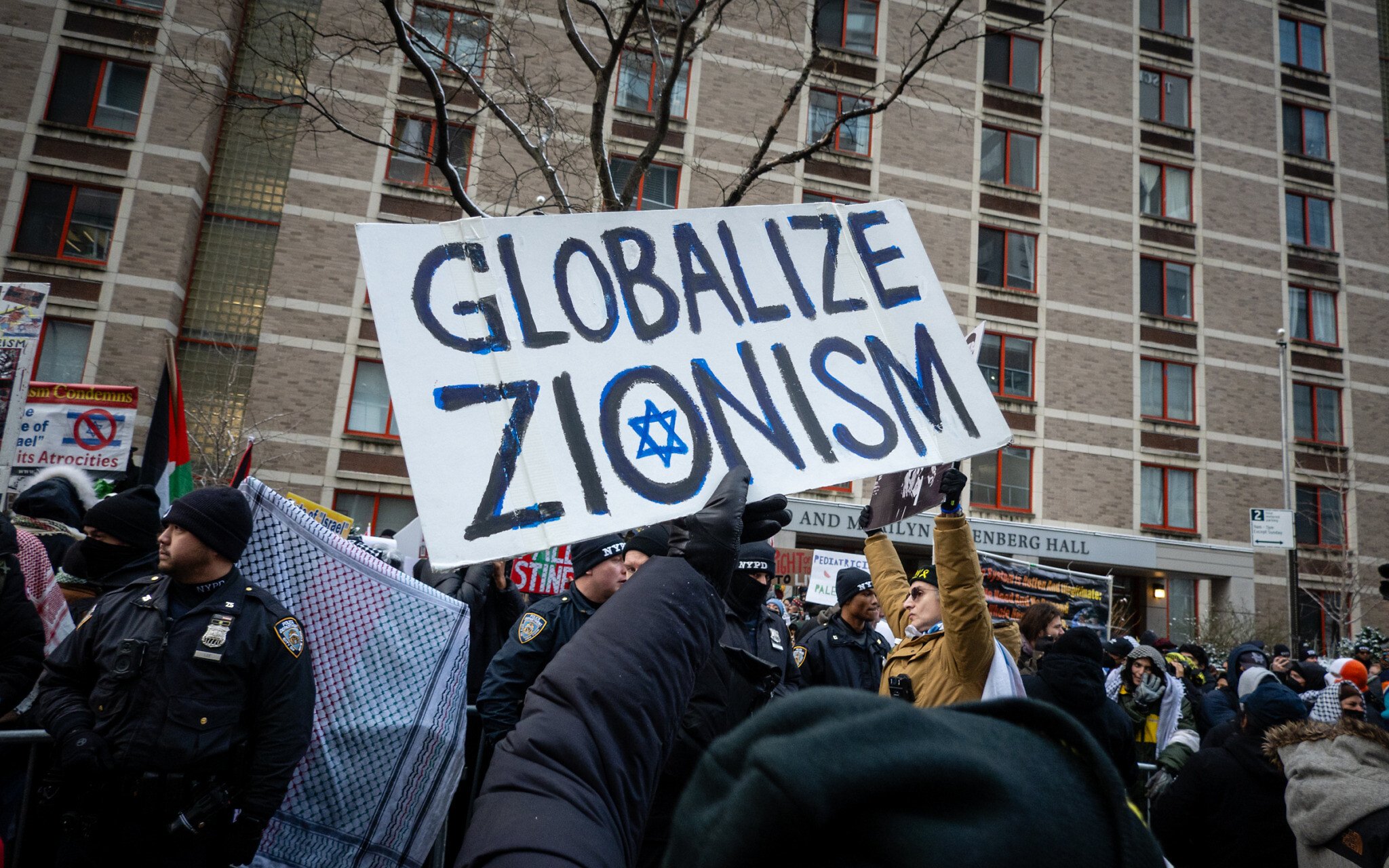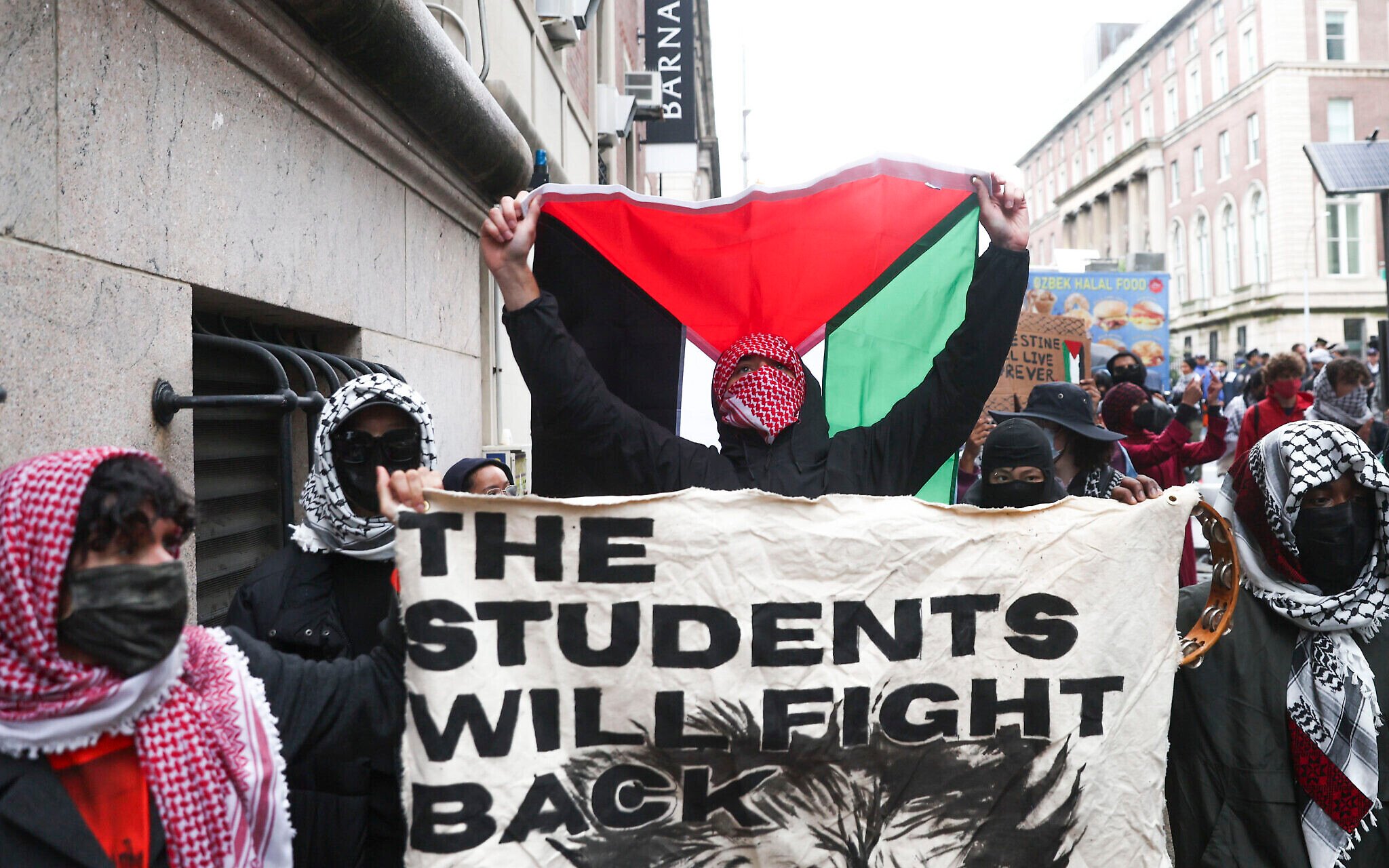NEW YORK — Daniel Rosen, a Jewish businessman in New York, was a pro-Israel activist while he was a student at New York University during the Second Intifada. He organized rallies, letter-writing campaigns and media appearances, but left the movement when he graduated in 2003 to work for a family business.
He retained his interest in Israel and Jewish wellbeing, though, and the October 2023 invasion of Israel came as a shock.
“I was like, ‘Holy shit, I can’t afford to sit on the sidelines any longer,’” Rosen said. “I was an armchair general. A lot of opinions, no action.”
He saw that online discourse was a key battleground for public opinion, and decided to launch a platform to counter anti-Israel chatter on social media. He pitched the idea to his rabbi, who told him, “I’m in,” and offered help, Rosen said. The idea led to Emissary, an app that organizes and informs pro-Israel activists online.
The outfit is one of several calling for an overhaul in the US Jewish community’s approach to the non-Jewish public as antisemitism surges in the US and Israel’s reputation declines, according to polls. The activists have set up their own groups and say that legacy Jewish organizations are failing to respond to the challenges of the moment. Some argued that pro-Israel Jewish organizations need to adopt tactics used by the anti-Israel movement.
Get The Times of Israel’s Daily Edition
by email and never miss our top stories
By signing up, you agree to the terms
“We need to organize ourselves inside and outside of the major Jewish organizations,” Rosen said. “We have to just go beyond them, around them, under them and over them to get to the people who care.”
Anti-Israel protesters in Times Square, New York City, June 16, 2025. (Luke Tress/Times of Israel)
‘We have a huge echo chamber problem’
Antisemitism is at record levels in the US, according to polling. US campuses have seen disruptive anti-Israel protests that sometimes veer into outright antisemitism, and activists have held thousands of anti-Israel demonstrations across the country.
Some of the insurgent Jewish activists believe the community’s groups need to rethink their strategy for communicating with the broader public.
Toba Hellerstein, the head of Attune Now. (Courtesy)
Toba Hellerstein, the head of Attune Now, a consulting group founded last year that has studied communications related to Israel and Jews, argues that Jewish organizations are largely speaking to other Jews in their advocacy, instead of looking outward.
“We have a huge echo chamber problem,” said Hellerstein, who is the founder of the Texas-Israel Alliance advocacy group and has a background in international consulting and diplomacy.
“What that looks like is us clinging to certain ways of communicating in certain lexicons. So, for example, we’re really focused on words like ‘Zionism’ and ‘fighting antisemitism,’” she said. “There’s a lot of attachment to the terms, but these terms, they hold a very different emotional meaning for us than they do for other Americans.”
Her group released a 140-page report in February that called for an overhaul in how the Jewish community communicates. To compile the report, the group convened non-Jewish focus groups in Texas, comprised of Black participants, Latinos, and white mothers.
Many focus group participants did not know Israel was a Jewish state, confused Israelis and Palestinians, and only around half knew about the October 2023 attack on Israel
The research found a “vast knowledge gap” between the public and Jewish communities. Many focus group participants did not know Israel was a Jewish state, confused Israelis and Palestinians, and only around half knew about Hamas’s October 2023 attack on Israel in which the terror group slaughtered 1,200 and took 251 hostages to Gaza. Others were surprised to learn Israel is the only Jewish state in the region and surrounded by Arab nations, an insight that altered their understanding of the conflict.
Jewish community representatives, meanwhile, assume a basic knowledge about the conflict due to their social circles’ familiarity with the issue, the report argued.
“Messaging that resonates within Jewish communities often falls flat with general audiences because it assumes shared knowledge, terminology, and emotional connections that outsiders simply do not have,” the report said.
Arguments that rely on history, jargon and geopolitical analysis are counterproductive, often alienating audiences who find the messaging inaccessible. Moral outrage over antisemitism can feel like scolding, causing audiences to feel defensive, the report argued.
“The core issue is that Jewish and pro-Israel advocates often communicate with non-Jews the same way they speak to other Jews — without recognizing that an entirely different approach is required,” the report said. Focus group participants, for example, said Israeli spokespeople after October 7 appeared “robotic, rigid, and cold,” coming across as defensive, instead of empathetic.
A protest led by Within Our Lifetime in Manhattan, September 17, 2021. (Luke Tress)
Pro-Palestinian advocacy, meanwhile, “masterfully harnesses emotion and visual storytelling” in a more easily digestible, social media-friendly messaging, particularly for younger Americans, the report said.
The report argued pro-Israel activists should adopt simpler, more raw narratives driven by human stories, and focus on building emotional connections instead of winning arguments. Younger generations in particular are averse to polished, bureaucratic messaging, like the carefully worded statements issued by many Jewish groups, the report said.
One focus group was shown a picture of the Black Israeli singer Eden Alene that was meant to start a discussion about race and representation, for example. The participants instead became curious about the music, highlighting culture’s ability to engage the public and open doors for a more nuanced perspective of Israel, and helping to relate to Israelis as people.
Zionism should be framed using universal values that are important to Americans, such as belonging and resilience, the report said, contrasting pro-Israel arguments with pro-Palestinian messaging centered on simple themes like justice, solidarity and resistance. Presenting a unified message from Jewish communities will be difficult, though, because American Jews represent a vast array of perspectives, while the pro-Palestinian camp is relatively unified in its messaging.
A pro-Israel activist at an anti-Israel protest at the NYU Langone Medical Center, New York City, January 6, 2025. (Luke Tress/Times of Israel)
Hellerstein advocated using curiosity and “tactical empathy” to connect with opponents, instead of defensiveness or arguments.
“Culturally, we go to hyper-intellectualization, and that makes it really hard to emotionally resonate with the public,” Hellerstein told The Times of Israel. “You can prove people are being unfair, but that doesn’t change their minds.”
Touching the third rail
The Coalition for a Safer Web, an advocacy group led by Marc Ginsberg, former US ambassador to Morocco and ex-White House adviser for the Middle East, issued a report in June, “AWOL From the Campaign Against Antisemitism.” The report accused Jewish organizations of disorganization and inefficiency that has allowed antisemitism to proliferate, and advocated for a more offensive approach. It called the status quo “intolerable” and demanded a “shift in strategy.”
The report called on the Jewish community to convene a national summit of experts; urged organizations and policymakers to create a unified battle plan for combating antisemitism; to appoint a private sector leader from outside Jewish organizations to head national strategy; use legal means to target funding and nonprofit abuses in the anti-Israel movement; invest in innovative tools, such as artificial intelligence, to combat online hatred; and train spokespeople.
A group of pro-Palestinian protesters march away from Columbia University on May 21, 2025, in New York. (AP Photo/Heather Khalifa)
“CSW is daring to touch the proverbial third rail and challenge the community, its donors, and its leaders to transform ‘uncoordinated’ into ‘coordinated’ responses to the threats,” the report said, adding that anti-Israel activists are “coordinating in lockstep.”
“The absence of a national director, a comprehensive strategy, and an all-points battle plan to better defend America’s Jews is not only inexcusable, but also a shanda,” the report said, using the Yiddish word for “disgrace.”
‘The absence of a national director, a comprehensive strategy, and an all-points battle plan to better defend America’s Jews is not only inexcusable, but also a shanda’
The report pointed to the array of Jewish groups releasing surveys about antisemitism, calling it a “numbing duplication of wasted effort.”
The report focused on online radicalization and funding for anti-Israel networks, saying Jewish groups should urge lawmakers and use legal means to stymie funding to activist groups tied to foreign actors, such as far-left organizations linked to the Chinese Communist Party.
“Our adversaries are exploiting every gap that we’re leaving wide open. Why? We could be closing these loopholes,” Ginsberg said.
Fighting the last battle
Some Jewish community leaders have acknowledged the need for a change in direction.
The head of the Anti-Defamation League, Jonathan Greenblatt, said at an annual summit in March, “We can’t keep doing the same thing over and over again and expect a different result.”
“We must identify what works and what doesn’t deliver results,” Greenblatt said. “We simply can’t keep doing something because it’s tradition or because some donor likes it.”
Greenblatt said the ADL is taking new approaches such as leaning into data to document the rise in antisemitism, using litigation to combat anti-Jewish discrimination, and has launched a Jewish exchange-traded fund on the New York Stock Exchange through ADL subsidiary JLens to oppose anti-Israel corporate boycott efforts.
‘When there is no moral shame, you can’t just scold someone into action’
“In a world where it is increasingly acceptable to be antisemitic, condemnation is not enough, because when there is no moral shame, you can’t just scold someone into action,” Greenblatt said.
Rosen hopes his app, Emissary, will counter anti-Israel activism on campuses and elsewhere. The app connects online activists who share a pro-Israel ideology, even if they are separated by geography, and Rosen has been pitching the platform to synagogues and students at Jewish schools.
Daniel Rosen, the founder of the Emissary advocacy app. (Courtesy)
He said the app will allow groups to coordinate “missions,” such as contacting members of Congress to thank them for support of Israel, to comment on inaccurate news reports about Israel, or to push a unified message or slogan online in a way that will get traction with social media algorithms.
Online commenters’ ability to shift discourse on Israel, particularly in nontraditional media such as podcasts, was on display last month after the Nelk Boys, podcasters with more than 2 million subscribers on YouTube, hosted Prime Minister Benjamin Netanyahu. The discussion drew harsh pushback and tens of thousands of comments, mostly negative. The hosts then held a discussion with anti-Israel commentator Bassem Youssef, who scolded the podcasters for speaking with Netanyahu and spread falsehoods about Israel. One of the show’s hosts, Kyle Forgeard, apologized for speaking with Netanyahu.
Rosen said Emissary will help pro-Israel advocates catch up with anti-Israel activists online, although it will be an uphill battle, as Jews represent such a small share of the global population.
“They’ve been doing this for 30 years. We just woke up. We just came to the party really late. They’re like an all-star NBA team, and we’re like JV, Yeshiva League basketball,” he said. “We’re not in the same category as them. But we’re still both trying to play basketball. We’re not organized.”
Emissary includes an AI feature that allows users to ask questions, such as how extremist criticism of Israel is related to antisemitism. The AI uses inputs from Jewish sources like the Anti-Defamation League and the American Jewish Committee. Rosen hopes college students will use the AI module to formulate arguments against anti-Zionist activity on campus.
He said the app is still in its early stages and has around 4,000 users.
All three activists who spoke with The Times of Israel argued that mainstream Jewish groups are fighting the last battle, instead of adapting.
“It’s not like we have organizations that were designed for Jewish life today. They’re relics of the past and inertia,” Hellerstein said.






